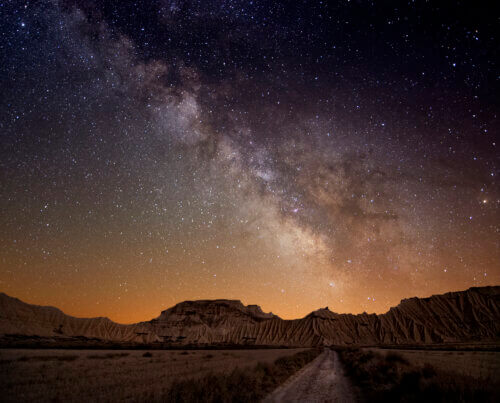Why was it easier for Galileo Galilei to observe the starry night sky than for us? Since during his time the light bulb had not yet been invented! It turns out that light pollution caused by artificial lighting not only interferes with stargazing, but also seriously harms life on Earth

Written by: Idan Brand
of: Young Galileo, sheet 200 September 2020
We owe the artificial lighting that provides us with light day and night to a large extent to the inventor of the electric incandescent bulb, Thomas Edison. We use it to light streets, roads, residential areas, shopping centers, factories, parks and more. And it turns out that she is causing real harm to the earth!
How can light pollute?
Light pollution affects the sky as well as the earth, meaning there are two types of light pollution: astronomical light pollution and ecological light pollution. We can see stars when we look at the sky at night, but until about 100 years ago it was possible to see many more stars, due to astronomical light pollution. The sun lights up the sky during the day, so we cannot see the stars during the day. The artificial light illuminates the sky at night and prevents us from seeing the stars as before.
Ecological light pollution causes a lot of damage to nature: many animals that are active at night are harmed by it. For example: migratory birds that navigate by the light of the stars at night are blinded by the bright night lighting, deviate from their course and collide with buildings; Newly hatched sea turtles are drawn to the lights of the nearby city instead of the shimmering sea; Large mammals that suffer from spatial disorientation or changes in their biological clock are run over on the roads; Many insects fly into streetlights and die.
The light pollution even reaches the water! Have you ever been to Eilat, watched the beautiful coral reefs and the light reflected in the water? Actually, the two don't exactly get along. The artificial light reflected in the water damages the corals and prevents them from reproducing. The researcher Dr. Oren Levy from Bar-Ilan University studied the Great Barrier Reef in Australia, where many corals reproduce miraculously on a single night a year. The exact timing depends on the changing illumination pattern due to the lunar cycles. Corals that were exposed to constant lighting did not release the reproductive materials into the water during the experiment and lost the short window of opportunity for reproduction. If so, the corals in Eilat - where there is more light pollution - are certainly much more damaged.
How does light pollution harm humans?
As mentioned, light pollution greatly affects the living creatures and the earth's sky, and it also affects us, humans. The blue light emitted from our screens (mobile phones, computers and televisions that we turn on during the hours of darkness) damages the secretion of melatonin in the body - a hormone whose function is to adjust the biological clock in animals and humans. Damage to melatonin secretion can cause mental stress, sleep disorders, lack of concentration, obesity, Alzheimer's, damage to the eyes, obesity, depression and even cancer.
What did the sky look like before light pollution?
Before the invention of artificial lighting there was no light pollution. Galileo Galilei (1642-1564) lived 300 years before Thomas Edison (1931-1847). In Galileo's time it was possible to see many more stars in the sky, and also the Milky Way galaxy. Today, it is impossible to observe the Milky Way galaxy from densely populated areas, due to the light pollution that hides many of the stars.
Light pollution exists in almost all states of the United States, Israel, Europe and the countries of the Far East, but there are places where light pollution is relatively small, such as Canada, Australia, Africa and a large part of Russia. In our country, in part of the Negev, the light pollution is less compared to the rest of the country, and there you can watch the stars.
Is it possible to prevent light pollution?
Each of us can help prevent light pollution in simple ways such as:
- Replace cold white bulbs (emitting blue light) with warm yellow bulbs, and use red headlights.
- Turn on light only in areas that really need it (for safety, for example).
- Increase awareness of the issue of light pollution and saving light.
People in Israel and around the world are working to reduce light pollution, including the "Or Mi'oim" group - a group of volunteers whose goal is to promote energy saving in outdoor lighting, improve its quality, and reduce the harm to nature and humans caused by light pollution. On top of that, the Nature and Parks Authority is working to reduce the damage by working with bodies that deal with infrastructure.
Join us on Facebook https://www.facebook.com/YoungGalileo
More of the topic in Hayadan:
